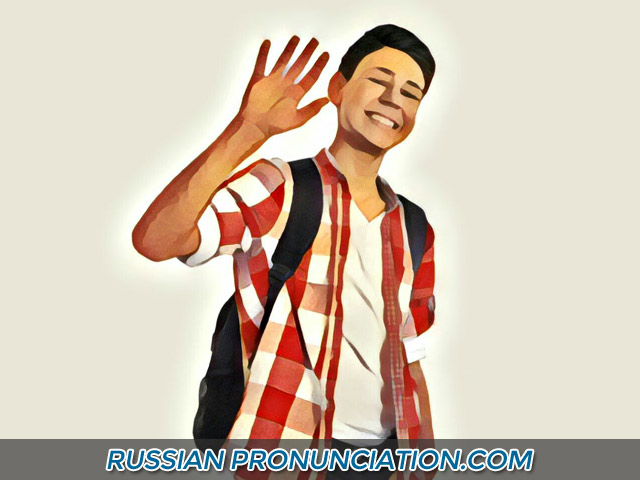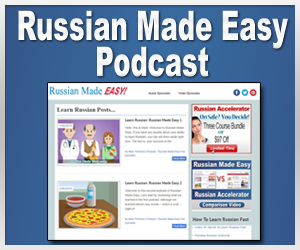
Full Episode Audio
Exercises Only Audio
Download Full Episode (right click save-as)
Welcome to episode 3 of Learn Russian Pronunciation. If you’re new to this course I recommend going back to episode #1 because the lessons are cumulative and they assume you’ve mastered everything in the previous episodes. Anyway, today we’ll be working with consonant clusters. That’s when you have three or more consonants in a row, with no vowel to break them up. English has them. Take the consonants S-P-L…Like the word Splash. That’s a cluster. Or this…I read this in a recipe. Add five twelfths of a pound. How many consonants are at the end of that word, twelfths? You have an L, an F, a Th, and an S. That’s four in a row….which is why it’s so hard to pronounce. Twelfths.
Russian, bless its heart, has even more consonant clusters than English. And because the rolled R is so often in these clusters, they can be tough to pronounce correctly. For ex:
вдруг
You have a V sound, a D, and a rolled R. Try it again…вдруг
Don’t worry about the meaning. Let’s just get the sounds down. Here’s another one…
вправо
It has a cluster of F-P-R. Here’s the native speaker:
Next…скрипка
That has an S-K-R cluster…like the English word “scrape”. Listen again…
This (violin playing) is a скрипка by the way. Let’s use that connection between “scrape” and “скрипка” as a way to remember the word. Repeat this sentence:
I gave up the violin because all I did was make scraping sounds.
So, that sentence gives us violin…and…scraping…which leads us to the Russian word скрипка
Let’s try those three ‘R’ clusters again: вдруг…вправо…скрипка
Of course, not all clusters contain an R. Try these…
кстати
That starts with a K, an S, and a T.
взлёт
That had a V, a Z and an L.
Next:
сквозняк
An S, a K, and a V.
Let’s try those three again: кстати…взлёт…сквозняк
(violin fades in) What’s this instrument again? скрипка
Good!
For our official new word of this episode, let’s try this one: встреча
That’s a cluster of four consonants in a row. An F, an S, a T, and an R.
вс…тре…ча
Hit pause and practice that one a few times on your own. Alright, lets see if you can you figure out the meaning.
So, I’m sitting with a friend in Starbucks and when I offer to buy a second round of drinks, he looks at his watch and shakes his head. “I’ve got an important встреча with a client. I’d better go.”
Or this: At work, I tell our secretary I need to speak with the boss, but she points to his office door. “He’s in a встреча right now. But if you take a seat…”
How would you translate that word? A встреча is a meeting. And it’s part of a very common phrase used when parting company with someone. In English, instead of ‘saying goodbye’ we might say, “See you later.” It implies that we’ll meet up again, right? In Russian, they say literally:
Until the meeting. Listen:
До встречи
Notice how the ‘a’ at the end of встреча has changed to an “ee” sound. Listen again…
There are a whole bunch of songs that have that phrase in their lyrics. I like this one the best…
(song): Монокини – До встречи на звезде
Here’s another four-letter cluster. Listen and repeat…
взгляд
That has a V, a Z, a G and an L….взгляд
Here’s another one…всплеск
F, S, P and L…всплеск
Let’s take a moment and do some cumulative review. My wife and I have twins. Sophia is our little girl. And William is our …мальчик.
Speaking of William, his favorite ____ is a remote control car.
игрушка.
Do you remember the word for violin? It’s not out official new word—I won’t hold you to it—but I’m curious if that mnemonic device worked. I gave up the violin because all I did was make scraping sounds. violin…scraping…leads us to…. скрипка
And what’s the Russian version of “See ya later”? Literally: Until the meeting…
до встречи
Those of you who’ve been studying Russian for a while might wonder why I’ve ignored the most common consonant cluster in Russian: здравствуйте It starts with a Z-D-R cluster…zdra…But I’m putting that one aside because we work with it in detail in Episode 4 of my Russian Made Easy podcast. Basically, I don’t want to repeat myself.
This was by no means an exhaustive list of consonant clusters, but we did cover the most common and most challenging ones. Next time, we’ll learn a fun technique called consonant-vowel separation, which will really help with your fluency. And since I’m gonna see you again in the next episode, how should I end this one? Until the meeting!
До встречи!
Podcast: Play in new window | Download

